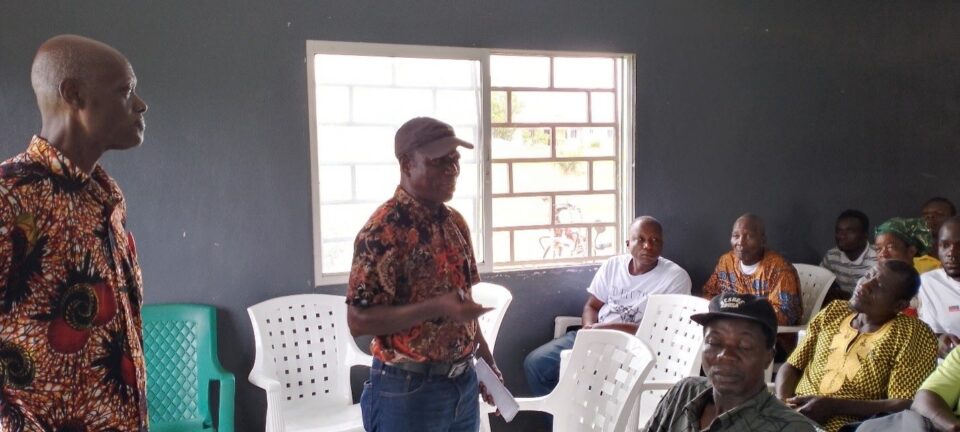PHOTO: Harris Wennie (far righ)t and the Buundi coffee expert interact with coffee farmers
By Augustine Octavius, augustineoctavius@gmail.com
Coffee farmers in Bong, Nimba, and Lofa counties said establishing cooperatives would be very helpful for their farming ventures, following the end of a week-long training exercise on the importance of the formation of cooperatives,
Prior to the civil, war in Liberia the country had stronger cooperatives, making it a major producer and exporter of coffee and other agricultural produce.
However, after the war, coffee cooperatives died down because many of the farmers abandoned the production due to lack of support. Farmers migrated to other tree crops like natural rubber planting, being motivated by the available market provided by Firestone Rubber Plantation Company.
Currently, most of the coffee farms in the country are more than 50-years old. However, farmers are still engaged in coffee cultivation despite experiencing very low yield.
The market for coffee remains volatile to the point where prices are highly negotiated at the detriment of the producers.
Significantly, coffee farmers, of the three counties (Bong, Nimba and Lofa) are now thinking of revitalizing their cooperatives to improve incomes. The three counties are known as the most productive coffee zones of the country.
The farmers said that revitalizing cooperatives is something that would be very helpful for their farming businesses.
They were recruited under the EU ACP Business Friendly Coffee Project in Liberia. The project supports coffee farmers in 5 of the 15 counties of Liberia.
The training was organized by the International Trade Centre (ITC) and Farmers Union Network of Liberia (FUNL) in collaboration with the Cooperative Development Agency (CDA) and the Ministry of Agriculture.
It was facilitated by Ephrem Sebatigita, a coffee expert from Burundi hired by the ITC. His mission is to assess the level of coffee production in Liberia and to educate the farmers on the importance of cooperatives to commercialize.
The workshop was attended by more than 300 coffee farmers from the three counties.
Linda T. Mahn, a coffee farmer in Nimba County said:
“I am inspired by the idea to form a cooperative, this is greatly going to be helpful. We most times don’t get attractive profits for our coffee.”
The market is very much unstable. But with a cooperative we are optimistic of getting good profit through better negotiations.
“I inherited the coffee farmers from my father who is now very old. With the help of the EU ACP project, I have learned new skills about coffee farming and we are looking forward to more support,” stated Ms. Mahn.
For his part, Seleke Bolloh, from Lofa County stated that forming cooperative will help push the agenda of farmers.
“I have more than 80 acres of coffee farm. But I have lacked support for my farm. When we heard of this project we were happy. If we have cooperatives, they will greatly help us as farmers in Lofa County,” he said.
The Cooperative Development Agency (CDA) is expected to lead the process to transition the farmers from coffee association to cooperatives.
The agency is the regulatory body of cooperatives within the country. Its mandate is for the development of all cooperatives within Liberia.
Harris B. Wennie, Program and Project Director at the CDA told our reporter that is institution was working with ITC and FUNL to ensure that cooperatives are established in the counties.
He said with the forming of cooperatives the coffee sector can gradually regain its status.
“Coffee cooperatives for this country did very well before the war. Many of the cooperatives worked with the defunct Liberia Produce Marketing Corporation to export coffee. But since the end of the war, some groups of farmers have been working as associations,” he explained.
The EU-ACP Business Friendly Coffee Project in Liberia has trained farmers on harvest and post-harvest losses, stumping and pruning of old coffee farms, the propagation of Robusta and Liberia coffee, and facilitated regional visits to coffee producing countries.

